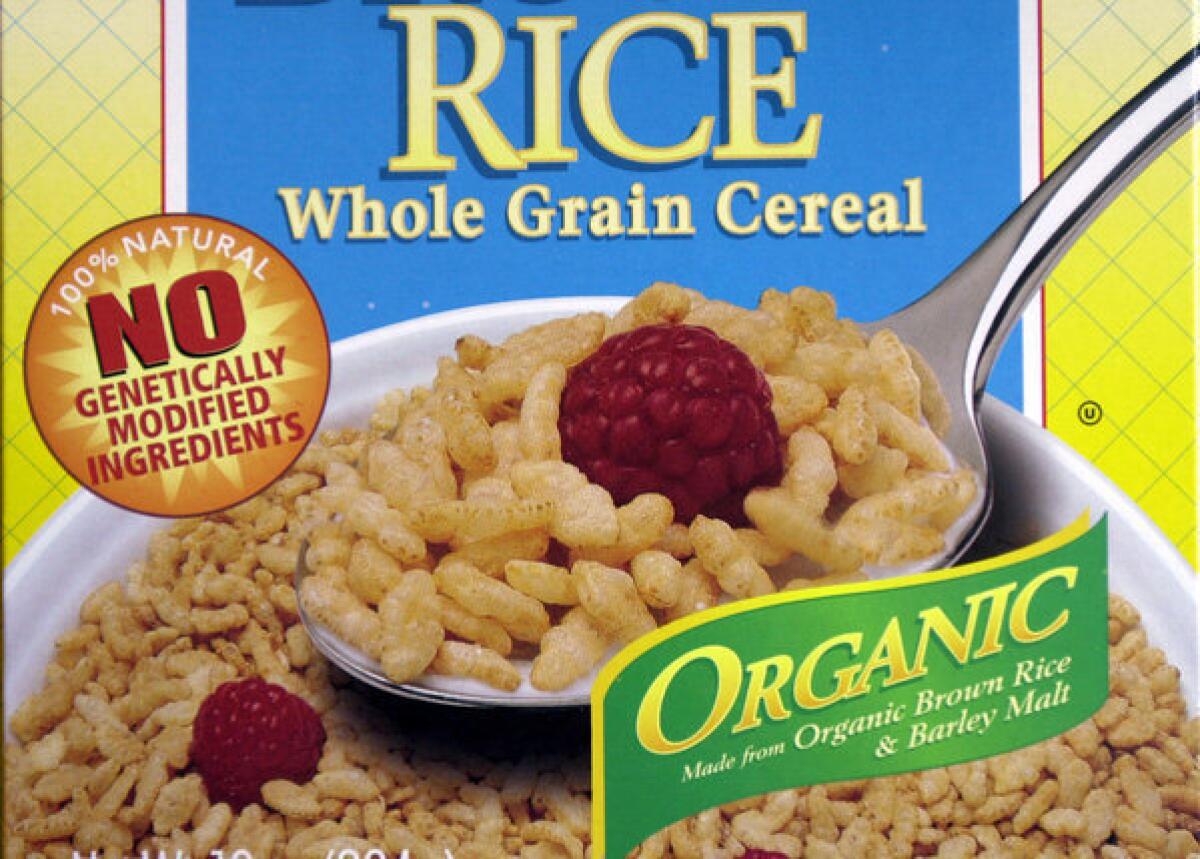Why this health-conscious foodie won’t vote for Prop. 37

I thought I’d be first in line to vote yes on Proposition 37, which would require labels on (most) food that contains genetically modified ingredients. But the closer we get to election day, the more conflicted I feel. Of course transparency matters. If I had my choice, there would be labels on everything, starting with canned food.
To say that it’s outrageous that we live in a country where food that has been soaked in pesticides or pumped full of antibiotics and hormones is allowed to be sold to consumers would be an understatement.
But if we’re going to start putting warning labels on food -- and let’s face it, GMO labels would be warnings, not just advisories -- then let’s focus on drawing attention to the poisons. Is it the corn and soy that have been genetically engineered to withstand pesticides that are the problem, or is it the pesticides?
ENDORSEMENTS: The Times’ recommendations for Nov. 6
As it stands, there are no known health risks associated with GMOs. Even “foodie intellectual” Michael Pollan had to acknowledge that in a recent piece in the New York Times Magazine, albeit with a skewed turn of phrase: “To date, genetically modified foods don’t offer the eater any benefits whatsoever -- only a potential, as yet undetermined risk.”
I recently debated this issue with a friend on Facebook. “No known health risks?” he challenged, directing me to a ton of information, including an article on the Organic Consumers Assn.’s website, which points to a growing body of scientific evidence that makes you question whether GMOs are harmless.
But is it credible? Or is it science for the sake of fulfilling an agenda? In a recent piece for Slate, Keith Kloor sounds a warning, shedding light on some of the many dubious studies, including the recent French research led by Gilles-Eric Seralini that found rats developed tumors after eating GMO corn. Kloor writes:
Within 24 hours, the study’s credibility was shredded by scores of scientists. The consensus judgment was swift and damning: The study was riddled with errors -- serious, blatantly obvious flaws that should have been caught by peer reviewers. Many critics pointed out that the researchers chose a strain of rodents extremely prone to tumors. Other key aspects of the study, such as its sample size and statistical analysis, have also been highly criticized. One University of Florida scientist suggests the study was “designed to frighten” the public. [...]
Another big red flag: Seralini and his co-authors manipulated some members of the media to prevent outside scrutiny of their study. (The strategy appears to have worked like a charm in Europe.) Some reporters allowed themselves to be stenographers by signing nondisclosure agreements stipulating they not solicit independent expert opinion before the paper was released. That has riled up science journalists such as Carl Zimmer, who wrote on his Discover magazine blog: “This is a rancid, corrupt way to report about science. It speaks badly for the scientists involved, but we journalists have to grant that it speaks badly to our profession, too.... If someone hands you confidentiality agreements to sign, so that you will have no choice but to produce a one-sided article, WALK AWAY. Otherwise, you are being played.”
“The bottom line for people worried about GMO ingredients in their food is that there is no credible scientific evidence that GMOs pose a health risk,” writes Kloor.
Still, people like the New York Times’ Mark Bittman, whom I truly do admire, are advocating for Californians to vote yes on Proposition 37. He argues that “even if there were a way to guarantee that food produced with GMO ingredients is not directly bad for you, it remains clear that such food is in general bad for all of us, based on the collateral damage from producing it.”
Again: If the problem is the pesticides, then why isn’t the Proposition 37 labeling initiative about that?
I, unfortunately, have had an undiagnosed digestive condition for more than a decade. I spent years in and out of hospitals and doctor’s offices trying to find the root of my problem, undergoing multiple tests and screenings, consulting with specialists and getting several opinions. Never, not once, did any doctor suggest that my diet might have contributed or caused my condition; nor did anyone suggest that changing my diet might help. I arrived at that conclusion on my own, and with the help of message boards and the online food community. The closest I got to a diagnosis was a sexist insult that I’d rather not repeat.
PHOTOS: Seven foods, genetically engineered
So, when it comes to food, it matters to me deeply that I can trust what I’m eating and that it won’t make me sick. Proposition 37 won’t help me accomplish that. And, while I understand the argument that you have to start somewhere (and that was initially my position too), I worry that a vote for Proposition 37 would be a vote for junk science -- and that passing it would thwart further (and valid) scientific studies. I’d be no better than the climate deniers out there. And I don’t want that; I want real answers, and real reform.
ALSO:
Endorsement: No on Proposition 37
Endorsements: The Times’ recommendations for Nov. 6
Follow Alexandra Le Tellier on Twitter @alexletellier
More to Read
A cure for the common opinion
Get thought-provoking perspectives with our weekly newsletter.
You may occasionally receive promotional content from the Los Angeles Times.






